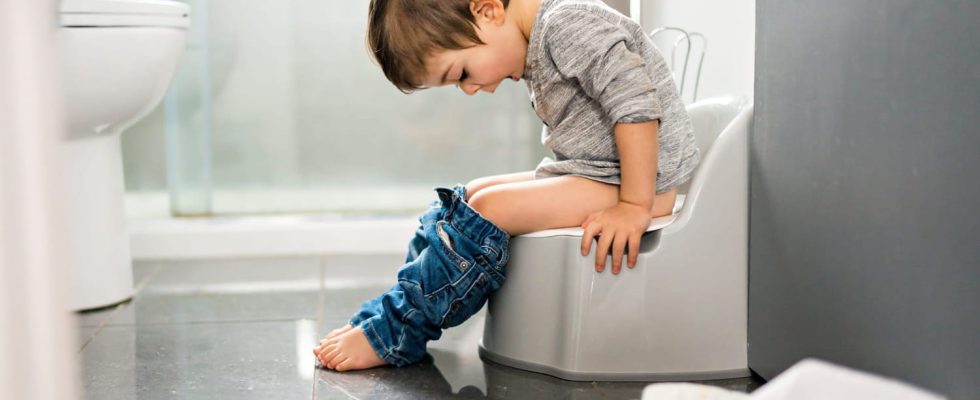Does your child answer “Wee, poo” to all the questions we ask him? If she often questions the parents, this phase is nevertheless a normal stage in the development of the child. Explanations by Vincent Joly, psychologist and psychotherapist for children.
From the age of three, most children have only these words in their mouths: “Wee-wee poo fart…“They laugh about it, and even use it as an answer to all the questions they are asked. For parents, these repeated phrases and these jokes made around excrement can sometimes be destabilizing. But in reality, behind this admiration hides a normal phase of child development. How to explain this interest in poo and pee from childhood and until what age does this phase last? Vincent Joly, psychologist and psychotherapist for children, explains to us in detail what it is about.
What is the “pee poo” phase in children?
Why do young children like to talk about pee and poo so much? This obsession is often linked to the acquisition of cleanliness. By having learned to be clean, “the child has gone through a stage of development that is very important for him, and often complex and distressing to put in place. Because for him, poo is losing a part of your body, that we drop into a hole and who disappears (once the toilet is flushed, editor’s note). This step is also important in the eyes of adults, parents and the school, since children today cannot be accepted at school if they are not clean”, explains Vincent Joly, child psychologist. Based on this observation, it is therefore not illogical for a child to talk a lot about peeing and pooping, because on many occasions, they have been made to understand that it is important that they know how to do their business on their own.
“For the child, pooping is having a part of your body that you lose, that you drop into a hole and which disappears”.
What is the “anal stage of the child”?
The “pee poo” phase can also correspond to the child’s anal stage. “The anal stage often refers to the period of about one and a half and three years of the child. For the philosopher Freud, this anal stage refers to a period of classic development of the child where his attention is focused around sphincter control”, develops the specialist. In other words, the young child tries to control his urges to poo, he chooses whether or not to do his business.
At what age does the “pee poo” phase begin?
“Children usually talk a lot about peeing and pooping from the age of 3”details the psychologist. This phase then stops around the age of 6 years.as the child will assimilate the fact that peeing and pooping is part of the normal functioning of his body and his organism.
My child responds “pee-caca” to all his sentences, what should I do?
As a parent, the first thing to do is take a step back from the behavior of the child: “Parents should try to remember how they were at that age. Because they too made jokes about peeing and pooping. These are also jokes that you hear as an adult”, points out the psychologist. We also know that we live in a society where children are often idealized and imagining them talking about poo is unacceptable to some parents. So, “the challenge for parents, during the development of the child, is to to mourn this ideal, wonderful child, and to accept him as he iswithout letting everything pass”, adds Vincent Joly.
It is also appropriate to set limits so that the child does not talk about it all the time. “There are rules of good manners to inculcate in the child.” You can also introduce a “dedicated storage time for poo and pee” : for a defined time only, he will be able to talk about it freely. Growing up, poops and pees will eventually lose their importance to your child. He will have understood that all this is normal and natural.
Thanks to Vincent Joly, psychologist and psychotherapist for children and adolescents in Paris.
